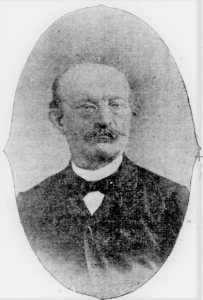
(Oct. 12, 1823-June 7-1908). Born in Prussian Silesia, Barus studied organ and piano in Brieg and Breslau. In 1849 he immigrated to the United States because of political turmoil in Europe. Settling in Cincinnati after a brief attempt at farming in Saginaw, Michigan, Barus began a notable musical career, playing the organ at several prominent churches, conducting the Philharmonic Society and Carl Barus orchestras, and directing male choruses of several German singing societies.
His prowess as a choral director earned him an invitation to conduct the 1854 Saengerfest concerts of the North American Saengerbund (NASB), a federation of German singing societies founded in Cincinnati in 1849. Gaining a national reputation at this event, Barus served as the musical director of four more NASB Saengerfests, including one held in Indianapolis in 1867. From 1858 to 1860, and again in 1868, Barus also conducted the Saengerfest concerts of the Indiana Saengerbund, a sub-federation of the NASB.
In 1882 Barus came to Indianapolis at the invitation of the . Under his direction the society enjoyed a period of great prosperity and musicality—staging operas and operettas, expanding its concert series, and operating a singing school for the children of its members.
He exerted a positive influence on the musical culture of the community by conducting the festival chorus at the opening of in 1886 and instituting the Indianapolis May Music Festivals. These events brought many renowned artists to the city and attracted national attention.
CITE THIS ENTRY
APA:
Snyder, S. G. (2021). Carl Barus. Encyclopedia of Indianapolis. Retrieved Feb 20, 2026, from https://indyencyclopedia.org/carl-barus/.
MLA:
Snyder, Suzanne G. “Carl Barus.” Encyclopedia of Indianapolis, 2021, https://indyencyclopedia.org/carl-barus/. Accessed 20 Feb 2026.
Chicago:
Snyder, Suzanne G. “Carl Barus.” Encyclopedia of Indianapolis, 2021. Accessed Feb 20, 2026. https://indyencyclopedia.org/carl-barus/.

Help improve this entry
Contribute information, offer corrections, suggest images.
You can also recommend new entries related to this topic.